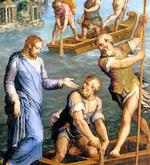Pope to restructure curial office to promote 'reform of the reform'?
February 09, 2011
Pope Benedict XVI plans to alter the jurisdiction of the Congregation for Divine Worship, placing its focus squarely on the effort to promote reverence and a sense of the sacred in the liturgy, according to Italian media reports.
The Pope will soon issue a motu proprio redefining the task of the Congregation for Divine Worship, reports Andrea Tornielli of Il Giornale. The report by Tornielli—who has correctly predicted a number of recent developments inside the Vatican—has been echoed by other Vatican-watchers.
The Congregation—technically known as the Congregation for Divine Worship and the Discipline of the Sacraments—will be relieved of responsibility for canonical questions about the administration of the sacraments. Those questions, under the terms of the motu proprio, will now be handled by the Roman Rota. The change would allow the Congregation for Divine Worship to devote its work entirely to the promotion of liturgical reform—a task that has always been a top priority for Benedict XVI.
The restructuring of the Congregation would further the Pope’s cherished goal of restoring reverence to the Roman liturgy. Cardinal Antonio Cañizares Llovera, the prefect of the Congregation for Divine Worship, has revealed that the Pope wants to encourage “a new, clear, and vigorous liturgical movement throughout the entire Church.” According to Tornielli’s report, the motu proprio has already been drafted and reviewed by canonical experts, and could be made public soon.
Father Federico Lombardi, the director of the Vatican press office, has confirmed that the Pope has been considering a motu proprio that would place juridical questions about the sacraments under the jurisdiction of the Roman Rota. He did not comment on the prospects for other changes in the work of the Congregation for Divine Worship.
For all current news, visit our News home page.
Further information:
- Un motu proprio per il culto divino (Il Giornale)
- Motu Proprio on a New Liturgical Movement? (New Liturgical Movement)
- Arriva il Motu Proprio di B-XVI che risistemerà la liturgia (Il Foglio)
All comments are moderated. To lighten our editing burden, only current donors are allowed to Sound Off. If you are a current donor, log in to see the comment form; otherwise please support our work, and Sound Off!
-
Posted by: frjpharrington3912 -
Feb. 10, 2011 12:45 AM ET USA
Bless the Holy Father for his Motu Proprio which seeks to restore greater reverance and a sense of the sacred for the liturgy. The Latin principle lex orandi, lex credendi makes sense because it expresses a metaphysical principle of human nature, namely, we believe and become what we do. When we removed the tabernacle from behind the altar, took down the altar rail, no longer knelt to receive holy communion on the tongue, we we were paving the way for a loss of faith in the real presence.
-
Posted by: Obregon -
Feb. 09, 2011 11:53 PM ET USA
It is very pleasing to read this news item. Hopefully Benedict XVI will go down in history as the Pope who reformed the liturgy and the days of careless liturgy will finally be behind us.
-
Posted by: -
Feb. 09, 2011 10:53 PM ET USA
Amen
-
Posted by: samuel.doucette1787 -
Feb. 09, 2011 10:17 PM ET USA
Deo Gratias! Pope Benedict XVI is proving himself to be not only the first rate theologian we all expected him to be but also a first rate administrator/governor of the flock he shepherds.
-
Posted by: impossible -
Feb. 09, 2011 7:31 PM ET USA
Thank God! Catechetical malfeasance cheated our children. Replacing instructional sermons with homilies “breaking open the word” (regurgitating the word?) cheats all. Catholic identity requires instruction, understanding and respect for our 3 “pillars,” Holy Scripture, Holy Tradition & Magisterium. Has the “Spirit of Vat II” PROTESTantized us into a false ecumenism? Archbishop Sheen said, "If you don't behave as you believe, you will end by believing as you behave." Lex orandi, lex credendi.
-
Posted by: filioque -
Feb. 09, 2011 6:15 PM ET USA
This wonderful news for the Church. Having CDW concentrate on liturgical life will give impetus and guidance to reforms in liturgical understanding and practice, including music. The leadership is already in place in the persons of Cardinal Cañizares Llovera and Archbishop DiNoia.







